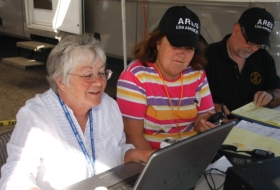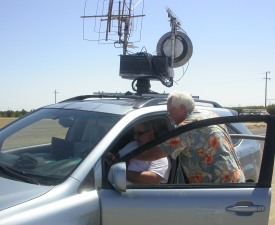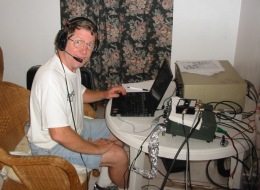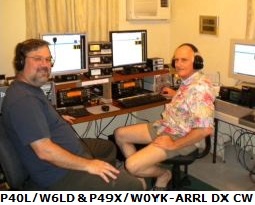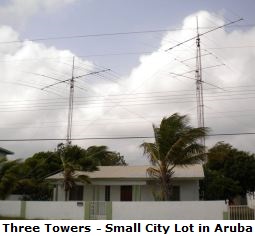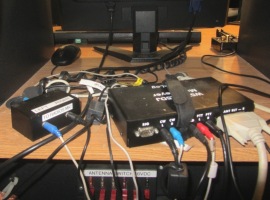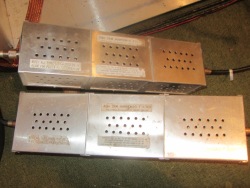Southern California Contest Club
ARRL Sweepstakes CW: November 1-3 <ARRL Sweepstakes SSB: November 15-17 NA Sprint SSB: November 23
ARRL Sweepstakes CW: November 1-3 <ARRL Sweepstakes SSB: November 15-17 NA Sprint SSB: November 23
Contest University and Visalia Contest Academy Presentations - N6TV
June 2019

Bob, N6TV from the Northern California Contest Club has made available his 2019 Contest University and Visalia Contest Academy PowerPoint Presentations. These are some really good reads. Thanks, Bob!
Why Public Service-Oriented Hams Should Participate in Contests - N6VI
March 2014
 You may have heard of the Fireman Olympics or lumberjack competitions. Most of you have seen a rodeo – at least on television - where cowboys (and cowgirls) do their
thing in a stadium rather than on the range. What do all these have in common? They test skills used on the job in an enjoyable yet challenging environment.
You may have heard of the Fireman Olympics or lumberjack competitions. Most of you have seen a rodeo – at least on television - where cowboys (and cowgirls) do their
thing in a stadium rather than on the range. What do all these have in common? They test skills used on the job in an enjoyable yet challenging environment.Guess what? Amateur Radio operators compete, too, in a variety of contests held throughout the country and the world. Internationally, this is called “Radiosport”. Domestically, we just call it “Contesting”.
Many highly competitive Radio Amateurs consider their regular operating time to be part of their training for competitions. In a larger sense, though, radio contests are training that improves our ability to do whatever else we do in Amateur Radio more effectively. more
Mid Week Contesting - W6SX
February 2014
 Sometimes can't get enough contesting on the weekends? Or sometimes can't get on on the weekends at all. Or want to practice contest skills in a low-stress
environment?
Sometimes can't get enough contesting on the weekends? Or sometimes can't get on on the weekends at all. Or want to practice contest skills in a low-stress
environment?Midweek contesting to the rescue.
Every Thursday night is the half-hour NS or NCCC Sprint. Sprints—love 'em or hate 'em. But, they are a great way to improve your skills. Half-hour doses make them very tolerable even if you are in the hate category. Give the NS a try—you'll be pleasantly surprised at how quickly you get the hang of it and how quickly your skills improve.
Every Wednesday of the month are the CWops Tests. Three separate one-hour sessions starting at 1300Z, 1900Z, and 0300Z. CW fans, we named the CWops Test a test, not a contest. CWTs offer something for everyone. You can get on and make a few contacts with fellow CW enthusiasts. You can get on and extend a friendly welcome to hams trying a CWT for the first time. more
RTTY Contesting for CW and SSB Contesters - W0YK / P49X
January 2014
 At the September 2003 NCCC meeting, a RTTY contesting presentation was made by AC6JT, K6UFO, N6DE and W6ZZZ (sk). A sub-theme of the presentation was to
rally club members to get on for the upcoming ARRL RTTY Round-Up in January 2004. The ARRL had just initiated a club competition for that contest and these
guys wanted NCCC to win it. I had never operated the RTTY mode, much less in a contest, but I was mildly curious to learn how the mode worked.
At the September 2003 NCCC meeting, a RTTY contesting presentation was made by AC6JT, K6UFO, N6DE and W6ZZZ (sk). A sub-theme of the presentation was to
rally club members to get on for the upcoming ARRL RTTY Round-Up in January 2004. The ARRL had just initiated a club competition for that contest and these
guys wanted NCCC to win it. I had never operated the RTTY mode, much less in a contest, but I was mildly curious to learn how the mode worked.As the speakers described a RTTY QSO, the main point was that the decoding hardware and/or software technology simply printed callsigns, exchanges, or anything sent by the other station. I remarked, “What’s the point of this?! The PC copies everything and could just as well stuff it in the log without the operator doing anything. Why couldn’t I just set all this up and then leave the room to drink beer while my station worked the contest?” more
Setting Up an SO2R Station - K6LA / VY2TTDecember 2013
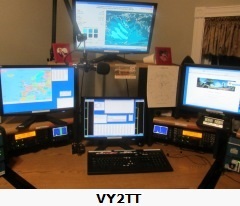
 This article will focus on the switching, filtering and ergonomic issues in setting up an SO2R station.
This article will focus on the switching, filtering and ergonomic issues in setting up an SO2R station. You already know you need two radios and two antennas. Of course, it is best if those two radios are identical to lessen confusion in the heat of battle, but they need not be.
The more separation between antennas the better, but on my city lot in Los Angeles, the antennas are so close that when I raise my motorized tower I have to make sure the yagis are turned the correct way on both towers or the elements will hit. more
Pack Roving or How To Win a VHF Contest From The West Coast - AF6O
November 2013
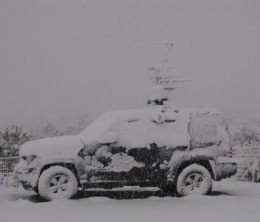 It is pretty much impossible to win the ARRL VHF and UHF contests from the Western US. We do not have the population density and we do not
get the propagation that some parts of the country do. With the advent of the Rover category a strategy emerged that eliminated the disadvantages
of population density and propagation, creating an opportunity for a win from just about anywhere.
It is pretty much impossible to win the ARRL VHF and UHF contests from the Western US. We do not have the population density and we do not
get the propagation that some parts of the country do. With the advent of the Rover category a strategy emerged that eliminated the disadvantages
of population density and propagation, creating an opportunity for a win from just about anywhere.The initial strategy, in use up to 2008, involved a number of ten band rovers travelling together to grid convergencies (points where four grids intersect). By working each other in all the combinations of grids available at a convergence it was possible to amass a large number of contacts and multipliers resulting in a winning score.
There was no reliance on propagation or population because the group was the source of many of its own contacts. Contacts with the general population were solicited as well but, in regions with little activity, most of the score came from inter group contacts. more
The practice of a number of rovers travelling together has become known as pack roving and the practice of rovers working each other in the many combinations of grids available at a convergence is called grid circling.
A group of Southern California contesters, led by N6NB, adopted the pack roving, grid circling strategy and started winning contests. They even tried it out of state, roving through New Mexico, Texas, Louisiana, Oklahoma, Kansas and Nebraska at various times.
As sometimes happens when an individual or a group achieves success, they became the target of criticism. In 2008, ARRL revised the rover rules to create three categories: unlimited rover, "classic" rover and limited rover. Unlimited rovers can freely grid circle or even operate at fixed stations in two or more grid squares, but their scores do not count in the club competition.
Classic rovers are eligible in the club competition, but they are limited to 100 contacts with any other rover, effectively ending the practice of grid circling by classic rovers. Limited rovers are subject to the same rules as classic rovers but they can operate only in the four lowest bands in the contest (6, 2, 222 and 432 in VHF contests).
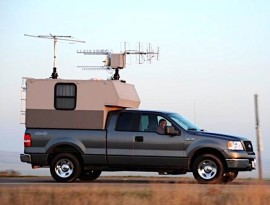 The 100 contact limit put an end to grid circling in the classic rover category because it was no longer possible to make enough contacts.
A new strategy was required to meet the challenge of the new classic rover rules. It became apparent that more 10 band rovers would be
required and more grids would need to be visited.
The 100 contact limit put an end to grid circling in the classic rover category because it was no longer possible to make enough contacts.
A new strategy was required to meet the challenge of the new classic rover rules. It became apparent that more 10 band rovers would be
required and more grids would need to be visited.Responding to the new rules, N6NB increased the number of 10 band stations to 13, of which five can be outfitted for an 11th band (24 GHz). Increasing the number of grids visited has demonstrated that it is still possible to win from the west coast using pack roving.
In this new strategy, in use after 2008, a group of rovers travel together but do not grid circle, saving their quota of 100 contacts entirely for new multipliers. As before, they solicit contacts on major calling frequencies as they move from grid to grid.
 Each rover is a 10 band station covering 50 MHz thru 10 GHz. The stations consist of two main parts: The console situated inside the vehicle
and the transverter box, with antennas, sitting on top of a rotator. The rotator is typically mounted to a baseplate
attached to the vehicle roof rack.
Each rover is a 10 band station covering 50 MHz thru 10 GHz. The stations consist of two main parts: The console situated inside the vehicle
and the transverter box, with antennas, sitting on top of a rotator. The rotator is typically mounted to a baseplate
attached to the vehicle roof rack.The console typically consists of the following elements:
- Two radios covering 50 MHz - 432 MHz or 1296 MHz. (One is the transverter IF)
- A switchbox permitting instant bandchanging.
- A Rubidium reference for the microwave transverters.
A conventional metal toolbox houses the transverters and power amplifiers together with a cooling fan; essential in the 100+ degree temperatures of the Mojave desert of Southern California. Two short masts attached to the toolbox carry the antennas. Not all stations are the same but typical antennas are loops or whips for the lower bands, yagis or quagis for 222 thru 1296, loop yagis for 2.3 and 3.4 and a dish with dual band feed for 5.7 and 10 GHz.
 The transverters are a mix of DEMI and Kuhne with a Rubidium reference applied to the four highest bands to ensure that all stations are
on the same frequency and no tuning required.
The transverters are a mix of DEMI and Kuhne with a Rubidium reference applied to the four highest bands to ensure that all stations are
on the same frequency and no tuning required.You can download Block Diagrams of the Toolbox and Console. (May require Acrobat reader, if you don't have it you can get a free copy here).
The Toolbox stations are constantly evolving. The addition of cooling fans has cured the occasional malfunction due to overheating. The Rubidium references have removed the need for stations to tune around for each other on the microwave bands. This has facilitated an increase in the QSO rate to 9 per minute between members of the pack.
The stations are capable of real communications and DX contacts are not unusual, even on the microwave bands. From the AF6O home QTH, N6NB has been worked in seven grids on 10Ghz, toolbox station to toolbox station. less
